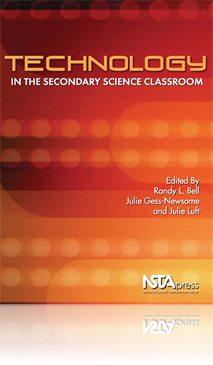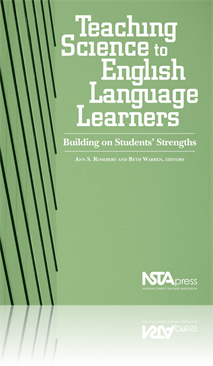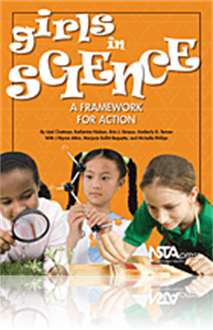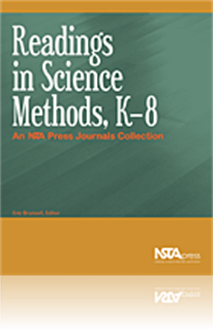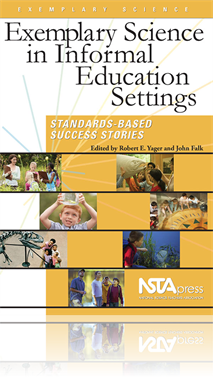All Book Chapters
Book Chapter
Probeware Tools for Science Investigations
Probeware is the general term used for probes and software that can be used with microprocessors (computer, calculator, palm device, etc.) to make scientific measurements. The characteristics of rapid data collection, nearly instantaneous display of ...
Book Chapter
Acquiring Online Data for Scientific Analysis
As you seek to provide more opportunities for your students to engage in scientific inquiry, you may find data collection to be time consuming and expensive. The internet, which provides immediate access to numerous data sets from government agencies...
Book Chapter
Online Assessments and Hearing Students Think About Science
This chapter examines online assessments and explores how they might be useful in your science classroom. Although there is a wealth of computer-based assessment tools (such as homework and exam generated programs that accompany many science textbook...
Book Chapter
Virtual schooling offers students the opportunity to enroll in a science course not taught at their home school or school district, interact with expert instructors in a particular field, and gain access to subject matter they may have otherwise miss...
Book Chapter
A Teacher's Perspective: Science Talks
What are science talks? And what are the benefits of including them in the science curriculum? Mary Rizzuto, a science curriculum instructional specialist at the Needham Science Center in Needham, Massachusetts, shares her perspective. ...
Book Chapter
Essay: Creating a Foundation Through Student Conversation
This essay discusses a pedagogical practice called Science talks. Science talks allow students to use their diverse language practices and life experience to understand scientific phenomena and allow teachers to see new connections between students�...
Book Chapter
What is culture? How does it figure into learning and teaching? What can educators do to make their classrooms sites of deep learning for all children? This essay examines the concept of culture, exploring how this concept has evolved historically an...
Book Chapter
Case Study: Using Students' Cultural Resources in Teaching
Teachers often want to incorporate their students’ cultural resources into the curriculum but do not know how. This case study describes what teachers participating in the Funds of Knowledge for Teaching Project, based at the University of Arizona,...
Book Chapter
A Teacher's Perspective: What Is Culture?
In her chapter, “What Is Culture?,” page 89, Norma González explains how the concept of culture has evolved historically and how it has affected education over time. As anthropologists continue to define culture in more dynamic ways, educators a...
Book Chapter
Essay: Learning a Second Language
What challenges face students who are learning a second language at the same time as they are learning science? This essay considers some of the difficulties associated with learning to speak, read, and write in a second language. Although the princ...
Book Chapter
Case Study: Using Two Languages to Learn Science
Often teachers ask their English language learners to confine themselves to using English as they explore ideas, frequently because the teacher does not know the child's first language. This case study tells the story of Jean-Charles who uses both hi...
Book Chapter
A Teacher's Perspective: Learning a Second Language
In “Learning a Second Language,” page 107, Ellen Bialystok explains the ways in which reading a science text in a second language makes learning more challenging. She explains that language is the core of science learning because it “is the pri...
Book Chapter
Essay: Programs for Teaching English Language Learners
Today's K-12 American classrooms are rich with students from families of diverse cultural, socioeconomic, and linguistic backgrounds. An increasingly important dimension of diversity in contemporary schools is language and, in particular, the relativ...
Book Chapter
A Teacher's Perspective: Programs for Teaching English Language Learners
In their essay, “Programs for Teaching English Language Learners,” page 129, Fred Genesee and Donna Christian take an in-depth look at some of the most frequently used educational approaches for teaching students who are learning English. They de...
Book Chapter
Essay: Creating Culturally Responsive Learning Communities
The population of the United States is more ethnically and racially diverse than ever, a fact particularly evident among young and school-age children. This presents today’s elementary schools—including teachers, administrators, and policy makers...
Book Chapter
A Teacher's Perspective: Creating Culturally Responsive Learning Communities
In their essay, “Creating Culturally Responsive Learning Communities,” page 151, Eugene García and Okhee Lee begin with the idea that human beings construct knowledge by “applying knowledge of previous concepts to the new information that is p...
Book Chapter
Essay: What Is Equity in Science Education?
Concerns about equity often influence and drive decision making by educators and policy makers. How do these concerns—and different understandings of equity itself—affect the quality and form of science instruction available for English language ...
Book Chapter
A Teacher's Perspective: What Is Equity in Science Education?
In his essay, “What is Equity in Science Education?,” page 167, Walter Secada challenges our understanding of equity by raising questions about how different meanings of equity can influence science education for English language learners. He hig...
Book Chapter
Conclusion: Reconceptualizing Diversity in the Science Classroom
This book has discussed steps teachers can take toward reconceptualizing diversity as an intellectual strength in the science classroom. By way of closing, the authors outline a path for those interested in pushing their practice further. It involves...
Book Chapter
Essay: Using Students' Conversational Style
In the United States, science instruction is based on an idealized, Western view of scientific practice and on the language practices of a middle-class population. Unbeknownst to teachers, this orientation ignores much of the knowledge and experience...
Book Chapter
Essay: Encouraging students' Imagination
How do scientists use their imaginations in their daily work and thinking? Is there a place for imagination in the science classroom? This essay explores the role that imagination plays in the intellectual work of science. Examples from professional ...
Book Chapter
Essay: Using Everyday Experience to Teach Science
How does everyday experience function in science learning and teaching? Is everyday experience a source of student misconceptions? Or is it an essential foundation of science learning? This essay examines everyday experience and its importance for al...
Book Chapter
A Teacher's Perspective: Using Students' Experience to Understand Science
Can students use their knowledge of natural phenomena to make sense of science in school? How can teachers use this knowledge to construct meaning in the classroom? Renote Jean-François, an English-as-a-second-language and literacy teacher in the Sh...
Book Chapter
Essay: What Is Academic Language?
When children learn science in school, they are learning both new ways of thinking about the world and new ways of using language to make meaning. This essay examines some characteristic ways in which academic styles of language are used in the scien...
Book Chapter
Essay: What Is the Vocabulary of Science?
What is the nature of the vocabulary words that children need to know to do well in science? How and where might children learn these words? In this essay, the authors explore these questions about the teaching and learning of the words of science. T...
Book Chapter
What can a teacher do when she realizes that she has used an apparently simple word like think in a way that some students find strange? This happened in Suzanne Pothier’s classroom of first and second graders. She decided to take up the problem a...
Book Chapter
The Triad Story—A Science Education Community Navigating Gender Equity
In chapter 1, Triad and the Framework are described from a community perspective. In chapter 2, the authors describe how the Framework evolved from a more theoretical standpoint. They introduce its anatomy and initiate a more detailed discussion of i...
Book Chapter
The Nature of Science and Science Inquiry
In a knowledge-centered science classroom, students work to answer scientifically oriented questions by creating explanations based on evidence. This approach, called science inquiry, is how science is conducted. It creates a learning environment tha...
Book Chapter
Youth Leadership at The Franklin Institute: What Happened When the Grant Ran Out
The Franklin Institute's Center for Innovation in Science Learning develops model programs for the K-12 science education community, both inside and outside the Museum walls. This chapter profiles the Institute's Partnership for Achieving Careers in ...
Book Chapter
Science Career Ladder at the NY Hall of Science: Youth Facilitators as Agents of Inquiry
The New York Hall of Science is New York City’s hands-on science and technology center, with more than 400 interactive exhibits exploring physics, chemistry, and biology. The Hall also creates and presents demonstrations and programs for students a...
Book Chapter
A Burger, a Beer… and a Side of Science
Science Cafés are part of a unique national informal education outreach initiative for NOVA ScienceNow, a PBS science series. The project's special focus is to reach new audiences—both on air and off—especially those younger than traditional PBS...
Book Chapter
The Museum Institute for Teaching Science (MITS) promotes the teaching of participatory, hands-on and minds-on, inquiry-based science, technology, engineering, and mathematics (STEM) at the K-8 grade levels, through collaboration among informal scien...
Book Chapter
Discovery Center at Murfree Springs, a hands-on museum and environmental education center, has created a science tour for grades preK-2, called “Splash, Flash, Crank, Slide, Alive Tour,” which is based on the National Science Education Standards....
Book Chapter
Grands Are Grand is a monthly informal science program for children ages 3-5 and their grandparents offered by the North Museum of Natural History & Science in Lancaster, Pennsylvania. The lessons include a wide variety of touchable, visual, and aud...
Book Chapter
FAMILY MATH and Science Education: A Natural Attraction
The Lawrence Hall of Science is a resource center for science and mathematics education and a public science center with exciting hands-on experiences for learners of all ages. One of its programs, FAMILY MATH, is built on the belief that children c...
Book Chapter
Informal education venues, by their very definition, are predisposed to the successful implementation of the More Emphasis conditions of the National Science Educations Standards (NSES), and Mote Marine Laboratory is no exception to this trend. At Mo...
Book Chapter
The Body of Evidence: COSI’s In Depth: Autopsy Videoconference Program
The Center of Science and Industry’s (COSI) Electron Education program, In Depth: Autopsy, allows students to see and participate in an autopsy as much as possible, given the limits of videoconference technologies. The program puts anatomy, physiol...
Book Chapter
Citizen Science at the Cornell Lab of Ornithology
The Cornell Lab of Ornithology is an international center for the study, appreciation, and conservation of birds located on a 200-acre wildlife sanctuary in Ithaca, New York. Founded in 1915 by Arthur A. Allen, the world’s first professor of ornith...
Book Chapter
Can an Informal Science Institution Really Play the Key Role in K–12 Science Education Reform?
The Washington State LASER (Leadership Assistance for Science Education Reform) program is under the leadership of the Pacific Science Center, an informal, nonprofit science institution, dedicated to increasing the public’s understanding and apprec...
Book Chapter
Advancing the NSES Vision through Informal Science Education
Despite originally being almost exclusively focused on the school context, the National Science Education Standards (NSES) emerged as an amazingly relevant document for the informal context as well. All four of the Standards—Teaching Standards, Con...



